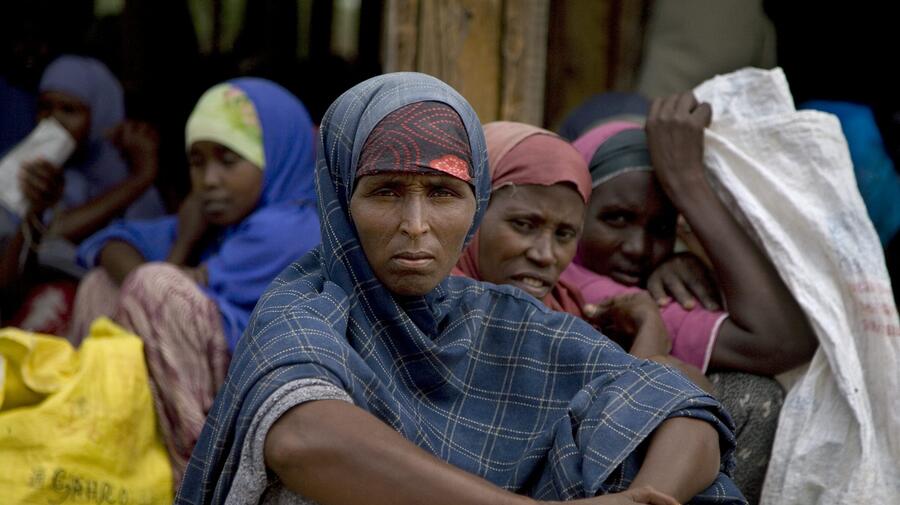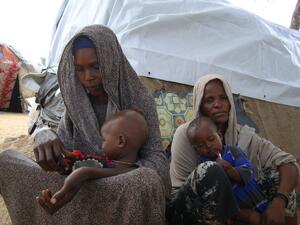Number of Somalis displaced in current wave of violence nears 120,000
Number of Somalis displaced in current wave of violence nears 120,000

A group of Somali women forced to flee their homes sit and ponder their future.
GENEVA, June 9 (UNHCR) - The UN refugee agency on Tuesday condemned the victimization of Somali civilians in Mogadishu after a weekend spike in the fighting in the capital sent thousands more people fleeing the city. This latest exodus pushed the number of displaced from the capital past the 100,000-mark to 117,000 since street battles erupted on May 8.
"UNHCR is gravely concerned about the violence and the fact that it is further aggravating an already desperate humanitarian situation on the ground," UNHCR spokesman William Spindler told journalists in Geneva on Tuesday.
The fighting between government forces and the opposition Al-Shabaab and Hisb-ul-Islam groups in several north-west areas of Mogadishu left more than 200 people dead over the past month, mostly civilians, with hundreds of injured in local hospitals.
"The manner in which civilians are being victimized by this conflict is unacceptable. Parties to the conflict in Mogadishu are fighting with no regard for the safety of civilians in clear violation of international humanitarian and human rights principles," Spindler said. "UNHCR is appealing to the belligerents to guarantee the safety and security of the civilian population."
In Nairobi, UNHCR's Representative to Somalia Guillermo Bettocchi also urged the rival forces to respect the rights of civilians. "The suffering civilians are going through is unacceptable. All warring parties in this conflict should be reminded of their obligations under international humanitarian and human rights law to protect civilians, to refrain from indiscriminate attacks on civilians and to limit their attacks to military targets," he said.
The majority of the displaced are women and children, many fleeing with very few belongings, and having to endure extremely difficult circumstances. Women are particularly vulnerable. There are reports of rape and sexual exploitation during their flight and in places of refuge. These risks are exacerbated by the limited humanitarian assistance available.
A 21-year-old woman, carrying her baby in her arms after fleeing Mogadishu by bus, told staff from one of UNHCR's local partners that her husband had been killed in the latest fighting and she wanted to make her way across the Gulf of Aden to Yemen. "I didn't give money to the bus driver, but he used my body," she alleged, while adding: "I will never come back to Somalia."
Reports received from local NGO partners supporting a hospital in Mogadishu's Dayniile neighbourhood indicate that of the 218 wounded people treated in that hospital, 81 were women and children under the age of 14, including a six-month old baby.
Countless families have allegedly been separated due to the conflict. The events of May have worsened a pattern of indiscriminate violence that has seen at least 34 schools temporarily occupied by armed groups since the beginning of the year, and at least six schools raided or shelled in the last 12 months.
Reports also indicate that people desperate to flee are stuck in their homes for days without food or water, no access to basic services, waiting for a lull in the fighting to escape the city.
A hospital in the strategically important Yaaqshiid district of Mogadishu, fearing for the safety of its scarce medical staff, was forced to cease operations temporarily and thus limiting access to medical care for wounded civilians.
Due to the latest escalation, UNHCR was forced to put on hold the scheduled distribution of life-saving aid in the vicinity of a location called Kilometre 13, on the south-eastern outskirts of the Somali capital. During this phase the UN refugee agency had hoped to provide humanitarian assistance to almost 30,000 people, but the distribution was halted due to fighting between opposition groups and government forces for the control of the main road from Mogadishu to the Afgooye district.
UNHCR is leading a task force to coordinate the response and interventions of all humanitarian actors in this new emergency.


